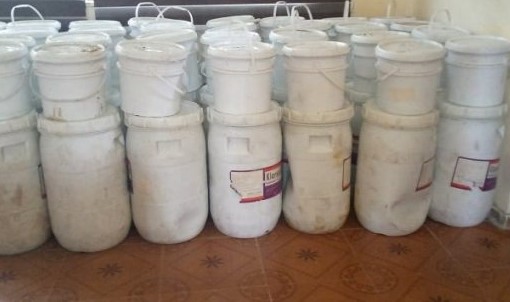Technicians of the Environment Protection Agency (EPA) have seized over 2.2 Metric Tons of Chemical smuggled into the country from neighboring Guinea, the agency the agency has said.
EPA Executive Director, Prof. Wilson Tarpeh told a press conference in Monrovia that the shipment originated from Guinea and is allegedly owned by one Madam Aisha Sherriff who is yet to be located.
“On Saturday, May 1, 2021, technicians of the Environmental Protection Agency backed by officers of the Liberia National Police (Zone 9 Depot) intercepted and confiscated a shipment of illegally imported chemicals at a warehouse in New Hope Community, Paynesville, outside Monrovia,” the environmental agency head said.
The shipment was brought into the country by a transport company operated by a man identified as Abdulai Kamara.
The EPA Executive Director noted that the chemical, comprising 80 containers in both small and large sizes, entered the country illegally and as such, thorough investigations into how the chemical entered Liberian territory are being conducted.
“At the warehouse, the team seized about 2,200 Kg (2.2 metric tons) of a chemical packaged in white HDPE buckets,” Prof. Tarpeh disclosed.
The confiscated chemical, he said, was packaged and labeled as sodium hypochlorite (bleach) — a compound most frequently used as a disinfecting agent for drinking water treatment.
“But when EPA technicians took a closer look at the HDPE buckets, a second label was identified as cyanuric acid — a chemical used to prevent chlorine loss in swimming pools,” he disclosed. “Liberia is no dumping site and we have to ensure that our environment and our people are protected against harmful substances.”
Cyanuric acid dissolves in water to initially form carbon dioxide gas and ammonia, and can be potentially toxic in drinking water at high concentration.
Several toxicity studies have demonstrated that cyanuric acid causes renal (kidney) tissue damage that leads to kidney failure.
The acts by Madam Sheriff and Mr. Kamara, the EPA said, violate Part 5, Section 53 of the EPA which speaks against illegal importation of chemical substances in the country and is punishable by huge fines and or imprisonment.
It is very unconventional to have a single chemical packaged and labeled as two different chemicals as in this case, and according to the EPA boss, it is highly likely that the chemical was procured on the black market and packaged in another set of containers to conceal the identity or the original producer/supplier.
With this in mind, the Agency fears that if such a practice remains unabated, it could pose a risk to human health and the environment.
“EPA remains committed to working with all stakeholders, both public and private, to ensure that Liberia remains a forbidden destination for toxic trade and illegal chemical shipment. EPA reassures the public of its inalienable commitment to ensuring a clean, healthy and safe environment for this and succeeding generations,” he said.
Sources within the agency say that Liberia is gradually positioning itself to resist the temptation of being a dumping ground for dangerous chemicals or other substances and toxic waste produced by developed countries.
Executive Director Tarpeh said the exercise, when successfully completed, will put Liberia on par with the region.
The exercise officially kicked off yesterday, May 5, 2021, and will focus on all facilities involved in the sale and application of agrochemicals, petrochemicals, industrial and laboratory chemicals.
Chemicals provide enormous benefits to society and play a vital role in the economy, but they may also carry risks for the environment (water, air, soil) and human health, he said.
“As industries have grown in recent years, so too have environmental and health concerns,” he noted.
As the competent national authority on all multilateral environmental agreements and guided by the Environmental Protection and Management Law of Liberia (EPML).
The Agency is conducting this exercise to abolish illegal chemical trade in Liberia and ensure that chemicals are adequately managed at every stage of the life cycle, as required by relevant international conventions to which our country is a party.























Comments are closed.